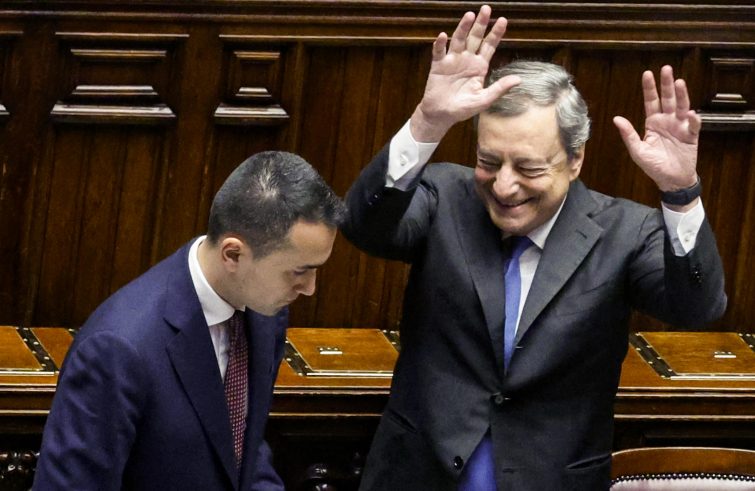
Italy remains under close scrutiny. It’s the result of a political crisis perceived – by some – as incomprehensible, dangerous, downright irresponsible. The failed endorsement of Draghi’s government, a personality widely esteemed in Europe and beyond, is making the headlines across global media, not to mention in the corridors of power in Berlin, Paris, London, Warsaw and Madrid. Including in Kiev and Moscow.
Here in Brussels (today is a national holiday in Belgium), the mood is grim. Confidence in Italy takes a huge backward step, dragging the country into an otherwise bygone era. President Mattarella’s authoritativeness remains intact throughout the EU, but it is not enough. After all, all five (at least) current crises – war, health, economy, energy and food – require political stability and long-term visions/projects, besides compliance with EU-level commitments. In fact, it should be noted that Europe allocates over €200 billion to Italy for the National Reform and Recovery Plan, with Mario himself as guarantor, now de facto powerless and on the sidelines.
While Putin’s entourage rejoices at Rome’s political turmoil, just as it had at the debacle of British PM Boris Johnson,
the question circulating in Brussels is whether – amidst election campaigns and a hypothetical soon-to-be government – Italy will fulfil the promises made to its European partners and to Ukraine, victim of the Russian invasion.
EU Commissioner for Economy Paolo Gentiloni voiced the concerns shared at the Berlaymont building, which houses the headquarters of the European Commission. The fall of Draghi’s executive “could trigger a perfect storm”, he said. He went on with an attempt to mend the wounds: “Now is the time to love Italy. Challenging months lie ahead of us, but we are a great country.” Leaders of other States tend to show respect for Italy’s domestic political situation, although Spanish Prime Minister Sanchez had openly supported Prime Minister Draghi, former ECB president, who in his opinion had saved the Euro currency from the 2008 financial crisis.
The foreign press is somewhat more explicit. Le Figaro, mouthpiece of France’s conservative voters, calls it “a power tragedy in several acts staged in Rome for several days.”
Spanish newspaper El Pais features a political analysis of the ongoing crisis with the headline: “Italy, another fire in the EU’s hellish summer.” The subheading clarifies:
“Italy slides into a grim wilderness marked by potentially prolonged instability and government inefficiency.”
Whereas a comment on the same newspaper reads: “Brussels is concerned that Italy may become the EU’s Achilles heel against Russia.” More specifically, another article reads: “Italian cabinets fall from power so often that it usually goes unnoticed in Brussels ( they last an average of 13 months since the end of World War II). But PM Draghi’s ousting comes at a time of major geo-strategic tensions.”
The outlook doesn’t differ across the ocean. For the New York Times, Italy’s ‘political chaos’ is described as follows: “Draghi Government falls apart, returning turbulent politics to Italy.” The Financial Times likewise foresees long-range difficulties ahead.
Politico.eu, a very popular site in Brussels and in European capitals, makes no concessions, outlining gloomy forecasts: ‘Draghi’s resignation will almost certainly lead to an early election this fall, which would plunge Italy into months of upheaval.” It reads: “The departure of 74 year-old Draghi, a former president of the European Central Bank, deprives Italy of an authoritative leader on the threshold of an unprecedented energy and cost of living crisis, and with a war on Europe’s doorstep.”
Critical remarks regarding the populist tendencies of some Italian parties, potential candidates for the Prime Minister’s Office, were voiced by German newspapers Welt and Die Zeit.
Also in Germany, news portal Rnd.de titled “A negative sign for the whole of Europe”,
featuring a photograph of Italy’s Salvini wearing a pro-Putin T-shirt in the centre of Moscow. In his commentary, Matthias Koch argues: “The three former ruling parties – without Draghi – now want to embark on a different path, one that better suits Russia. […] The existing unity in the EU and NATO, praised worldwide, is likely to end in a government without Draghi, with Moscow potentially worming its way into both institutions via Rome.” Harsh words, indeed unfair to our country, but indicative of a somewhat creeping feeling, however disguised, spreading throughout Europe.









